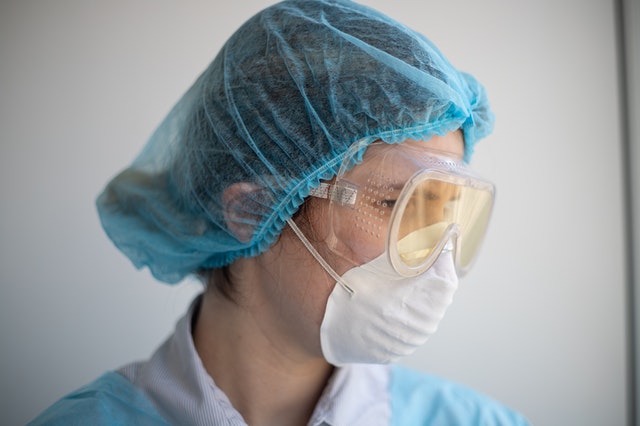
As the coronavirus continues to ravage the world, health authorities around the world are urging people to wear masks in public to curb the spread of the virus.
From the onset of the virus, the World Health Organization (WHO) and the (CDC) made it clear that the information they have on the virus is still quite limited. However, what we do know at present is how the virus spreads from person to person, and what we can do to limit the spread.
As per the CDC, the coronavirus primarily spreads through airborne pathogens in respiratory particles or droplets. When a person infected with the virus talks, sneezes, or coughs, they will exhale droplets that when inhaled by a non-infected person, can potentially get them infected.
There’s also the fact that there are some peoples after contracting the virus, did not show any symptoms of having it. This makes it easy for them to unknowingly spread the virus to people who would otherwise experience severe symptoms once infected by Covid-19.
People who work in health care provision are advised to use the N95 mask at work but they first have to receive training and a fit test before using an N95 respirator at work. It’s worth pointing out that there is no such directory for public use.
In light of this revelation, the CDC and the WHO recommend that people wear face masks when out in public. Face masks are able to absorb the respiratory droplets communicated by people as they engage others in conversation, sneeze, or cough. This feature allows them to limit the spread of the virus significantly.
However, there are different kinds of face masks with different functionalities in the market today. It’s easy for anyone to get overwhelmed when shopping for face masks.
The WHO recommends the use of regular fabric face masks for the mass public. Unfortunately, regular face masks, unlike other masks such as N95 masks, are not subject to regulation by health authorities.
How sure are you the face mask you have meets the standards required to protect you and your loved ones from the coronavirus? Here’s what you need to know about the N95 mask and why it is more effective than regular face masks.
What Are N95 Masks and How Do They Differentiate From Regular Face Masks
N95 masks are worn by healthcare workers as well as workers at factories working with industrial chemicals or paint. They are more of respirators than they are face masks hence the ‘N’ in the name. The ‘N’ is a respirator rating letter class and it stands for non-oil. The 95 means the mask has a 95% efficiency in that it can block out 95% of the contaminants in the air.
The U.S National Institute for Occupational Safety and Health is the main regulator of N95 masks and requires them to filter out 95% of tiny particles such as mist, fumes, and dust with a minimum size of 0.3 microns. This means large droplets containing coronavirus-causing pathogens will not pass through the mask.
Regular face masks, by comparison, are mostly designed to restrict the wearer from spreading bacteria and are much simpler to wear.
How Efficient Are N95 Masks Compared To Regular Masks
As highlighted above, the filtration system in the N95 mask is designed to trap at least 95% of contaminants measuring an average of 0.3 microns. However, viral particles are a lot smaller than that size. To counter this, the N95 filter uses mechanical and electrostatic media to capture nanoparticles which mainly travel through Brownian motion.
Fabric masks, on the other hand, are made from regular cloth material. How effective the fabric is in filtering particles and oral droplets depends on how thick it was woven. The production of regular masks is, however, unregulated. This means the efficacy of regular masks is not entirely clear.
Some people have opted to create masks from their own homes to customize the entire production process according to their preferences. As good an idea it is, DIYers probably don’t have access to the right equipment to conduct any tests on the efficiency of the face masks.
Some N95 masks come with an exhalation valve designed to reduce exhalation resistance thus making it easier to exhale. But a lot of people have spoken against the use of N95 masks with valves.
While they offer brilliant service in filtering out viral particles, valved masks do not filter out the exhaled air. This means if a wearer is infected by the virus, then the air they exhale may pose a risk of infection to other people since it will be passing through the valves unfiltered.
When convenience is considered, regular masks are easy to wear and also quite cheap to make. N95 masks are a bit hard to come by as suppliers have reserved most of the available stock for use by healthcare workers.
Experts have tried to discourage people to use N95 masks as it may cause a shortage for people who need them the most and because people are not well-informed on how they should wear N95 masks appropriately.
Improper wearing of the mask might not place a proper seal around the mouth and nose thus leaving the wearer potentially exposed to the virus
Any Sort of Protection Is Important
Scientists and medical experts are working around the clock to keep infection rates of Covid-19 low. However, one thing they’re unable to control is the widespread alarm over the coronavirus.
The lack of adequate information or even misinformation, especially regarding how people can protect themselves and their families from the novel coronavirus has brought about a lot of concern with people practicing social distancing and good hand hygiene.
As far as face coverings go, the N95 mask offers the best protection against the spread of the virus. They’re however a bit difficult to find as they are mostly reserved for use by front-line healthcare workers. This makes the use of regular masks for most people a more viable solution.
No mask is perfect and having one on should not give you full assurance that you might not get infected with Covid-19. However, a mask might prove the difference between getting hospitalized by the virus or not.




